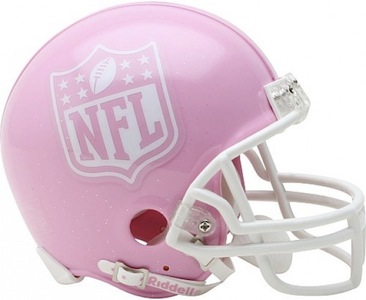If the NFL really wants to find a way to monetize their female fan base, it will take more than a few stadium rule changes, says Kelly Siegel-Stechler.
I’m a woman. A skirt-wearing, home-cooking woman. And I really, really love American football. Not in a pink jersey sort of way, either. I love the combination of power and finesse on display. I love the hours of practice and honing of very specific skills that could maybe make or break one small play. I love how much can happen in a two-minute drill. I love the theory and strategy that goes into play calling. I love learning about players and teams and building a couple solid fantasy teams each season.
For as long as I can remember, I have also loved going to professional sporting events. I usually go to about as many baseball games as I can afford each year, and last year I was able to go to my first NFL game. This season, my husband and I were lucky enough to win some pretty incredible pre-season football tickets. We got to sit in the front row at the corner end-zone, and one of the players made a diving touchdown catch just a few feet away. It was one of the most spectacular things I have ever seen, and I wish I could share that sort of experience with more of my female friends.
Last month, Shawnee Barton published a piece for The Atlantic in which she argues that to expand their female fan base and capitalize on women’s spending power, the NFL needs to do more than market to us; they must provide a better stadium experience. I think she’s absolutely right, but where our arguments diverge is in exactly what is wrong with the NFL fan experience when it comes to women at football games.
I don’t have small children, so while I find the no-purse rule frustrating and obnoxious, I can cope. And while I worry about violence at the stadium, I’ve been to enough Red Sox vs. Yankee games in my life to know how to avoid potentially harmful conflicts. Instead, during my last visit to the Meadowlands, it was the crowd that ruined my night. I have never enjoyed watching a game less. Our seats were surrounded by young men, between the ages of 18 and 22, who spent most of the game making degrading comments about women. They hadn’t even met each other before, but they instantly bonded over how, at college, they were “swimming in pussy.”
The most upsetting part of this entire experience was how mutely my husband and I sat there and let this go on around us. I spoke up only once, when one of them complained that a girl was trying to join his fantasy football league. And after I mentioned that I love fantasy football, he summed up his ridiculous response with “but I totally believe that a girl could be good.” When they repeatedly heckled a female sideline reporter who was walking back and forth, I thought silently about all the things I could shout out to make her feel better. And I didn’t feel like I could ask stadium security for help, because they weren’t specifically harassing us. It was endlessly frustrating. How did this sort of speech and behavior become the norm?
Watching football at home on Sundays, very little NFL advertising and commentary acknowledges the presence of women as fans or even real people. Most ads shown during games and by NFL sponsors feature solely men as fans, most notably Bud Light, where women are often placed off to the side in crowd shots as though they’re just there to avoid this sort of criticism. Women are rarely featured as serious sports reporters by the networks that cover football, instead they’re used for color and sideline glamour shots.
Last week, I watched two men and one woman “breakdown” who they thought would win the weekly game. The men sat on opposite sides of the table and engaged in lively debate; the woman smiled and looked back and forth between them for five minutes before stopping them to go to commercial. Women are not coaches or referees, but they’re paraded for objectification as cheerleaders or singers in skimpy outfits. These tropes are persistent throughout our culture and media, but they are exemplified by the industrial complex that is the NFL. If I were an 18-year-old boy who’d been watching football my whole life, I might have a hard time taking women seriously, too.
I can’t imagine that it’s only the setting of the football game that made these men believe it’s perfectly acceptable to make hateful comments about women, even in the presence of them. It did, however, give them a venue, and teach them that they can feel more like men by making women feel like less.
If the NFL really wants to find a way to monetize their female fan base, it will take more than a few stadium rule changes. They need to start taking women seriously as both fans and consumers, and show us a football culture we have a place in, not one we’d rather avoid.
Kelly Siegel-Stechler lives and works in New York City where she focuses full-time on education and politics, and part time on feminism. She loves to cook, read, and travel. She blogs at www.afeministmarriage.com.
Related Links:

